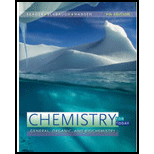
Concept explainers
(a)
Interpretation:
The balanced neutralization reaction of the given base with
Concept introduction:
The process in which the reactants combine to form a new product is called a
(b)
Interpretation:
The balanced neutralization reaction of given base with
Concept introduction:
The process in which the reactants combine to form a new product is called a chemical reaction. A chemical reaction can be represented using a chemical equation. A balanced equation is the one where the number of atoms of each element is equal on both sides of the equation.
(c)
Interpretation:
The balanced neutralization reaction of the given base with
Concept introduction:
The process in which the reactants combine to form a new product is called a chemical reaction. A chemical reaction can be represented using a chemical equation. A balanced equation is the one where the number of atoms of each element is equal on both sides of the equation.
Trending nowThis is a popular solution!

Chapter 9 Solutions
Bundle: Chemistry for Today: General, Organic, and Biochemistry, Loose-Leaf Version, 9th + LMS Integrated OWLv2, 4 terms (24 months) Printed Access Card
- 7. Draw the Lewis structures and molecular orbital diagrams for CO and NO. What are their bond orders? Are the molecular orbital diagrams similar to their Lewis structures? Explain. CO Lewis Structure NO Lewis Structure CO Bond Order NO Bond Order CO Molecular Orbital Diagram NO Molecular Orbital Diagramarrow_forwardDon't used hand raiting and don't used Ai solutionarrow_forwardDraw the condensed structure of 4-ethyl-1,2,4-trifluoro-2-methyloctane.arrow_forward
- 5. The existence of compounds of the noble gases was once a great surprise and stimulated a great deal of theoretical work. Label the molecular orbital diagram for XeF (include atom chemical symbol, atomic orbitals, and molecular orbitals) and deduce its ground state electron configuration. Is XeF likely to have a shorter bond length than XeF+? XeF XeF+ Bond Orderarrow_forwardDon't used hand raitingarrow_forward4. The superoxide ion, Oz, plays an important role in the ageing processes that take place in organisms. Judge whether O2 is likely to have larger or smaller dissociation energy than O2. Molecular Orbital Diagram 8 02 02 Does O2 have larger or smaller dissociation energy?: Bond Orderarrow_forward
- Will a weak base with a pKa of 8.4 be best absorbed in the stomach or the intestine? Explain your reasoning behind your answer. Use a chemical equilibrium equation in your answer.arrow_forwardYou have started a patient on a new drug. Each dose introduces 40 pg/mL of drug after redistribution and prior to elimination. This drug is administered at 24 h intervals and has a half life of 24 h. What will the concentration of drug be after each of the first six doses? Show your work a. What is the concentration after the first dose? in pg/mL b. What is the concentration after the second dose? in pg/mL c. What is the concentration after the third dose? in pg/mLarrow_forwardHow many different molecules are drawn below?arrow_forward
- Only 100% sure experts solve it correct complete solutions need to get full marks it's my quiz okkkk.take your time but solve full accurate okkk chemistry expert solve it.qno4arrow_forwardNonearrow_forwardA complete tensile test was performed on a magnesium specimen of 12 mm diameter and 30 mm length, until breaking. The specimen is assumed to maintain a constant volume. Calculate the approximate value of the actual stress at breaking. TABLE. The tensile force F and the length of the specimen are represented for each L until breaking. F/N L/mm 0 30,0000 30,0296 5000 10000 30,0592 15000 30,0888 20000 30,15 25000 30,51 26500 30,90 27000 31,50 26500 32,10 25000 32,79arrow_forward
 ChemistryChemistryISBN:9781305957404Author:Steven S. Zumdahl, Susan A. Zumdahl, Donald J. DeCostePublisher:Cengage Learning
ChemistryChemistryISBN:9781305957404Author:Steven S. Zumdahl, Susan A. Zumdahl, Donald J. DeCostePublisher:Cengage Learning Chemistry: An Atoms First ApproachChemistryISBN:9781305079243Author:Steven S. Zumdahl, Susan A. ZumdahlPublisher:Cengage Learning
Chemistry: An Atoms First ApproachChemistryISBN:9781305079243Author:Steven S. Zumdahl, Susan A. ZumdahlPublisher:Cengage Learning
 Chemistry by OpenStax (2015-05-04)ChemistryISBN:9781938168390Author:Klaus Theopold, Richard H Langley, Paul Flowers, William R. Robinson, Mark BlaserPublisher:OpenStax
Chemistry by OpenStax (2015-05-04)ChemistryISBN:9781938168390Author:Klaus Theopold, Richard H Langley, Paul Flowers, William R. Robinson, Mark BlaserPublisher:OpenStax Introductory Chemistry: A FoundationChemistryISBN:9781337399425Author:Steven S. Zumdahl, Donald J. DeCostePublisher:Cengage Learning
Introductory Chemistry: A FoundationChemistryISBN:9781337399425Author:Steven S. Zumdahl, Donald J. DeCostePublisher:Cengage Learning General Chemistry - Standalone book (MindTap Cour...ChemistryISBN:9781305580343Author:Steven D. Gammon, Ebbing, Darrell Ebbing, Steven D., Darrell; Gammon, Darrell Ebbing; Steven D. Gammon, Darrell D.; Gammon, Ebbing; Steven D. Gammon; DarrellPublisher:Cengage Learning
General Chemistry - Standalone book (MindTap Cour...ChemistryISBN:9781305580343Author:Steven D. Gammon, Ebbing, Darrell Ebbing, Steven D., Darrell; Gammon, Darrell Ebbing; Steven D. Gammon, Darrell D.; Gammon, Ebbing; Steven D. Gammon; DarrellPublisher:Cengage Learning





